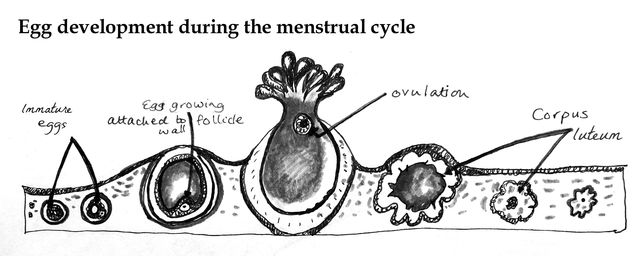Stress
Desperate For a New Baby This New Year? You Are Not Alone
Struggling to conceive can cause heartache. Here are 5 ways to ease the stress.
Posted December 28, 2017
Did you know that the end of December and early January are the busiest times of year for making babies? The birthrate peaks in September in the US and in the UK. Which means that on both sides of the pond, the number of couples trying to conceive is at its height around the New Year.

Whilst a birth after a full-term pregnancy at the end of September marks conception on or around New Year's Eve, what about those for whom getting pregnant is not so straightforward? For the 1 in 6 heterosexual couples experiencing fertility issues, trying to conceive can be traumatic. And for those who are single or in same-sex relationships and keen to have a baby, the journey is not as straightforward either. Hearing of successful pregnancies and witnessing others' happiness can escalate anxiety and stress, so I talked to Fertility Counselor Tracey Sainsbury about the impact of trying to conceive and fertility treatment, and asked for her suggestions on how to reduce worry and panic.
If pregnancy doesn't go to plan

Many couples are keen on September as a birthday as it means their child may get an advantage at school. 'But planning for pregnancy often starts months, even years ahead,' says Tracey, who works as a Fertility Counselor at the Lister Clinic in London, and who has also been through and written about her own journey of fertility treatment. Little surprise then, that the sense of expectation is so huge. 'With so much invested, if conception doesn't occur, the result can be feelings that seem overwhelming. These emotions can be misunderstood by those who are trying to get pregnant, and also by those who love and care for them.' She explains that this misunderstanding can lead to difficulties in relationships, both personal and professional.
She believes it's helpful for each individual to find ways they might cope better with specific situations and suggests five strategies to deal with each one. 'These tips are useful whether you are trying to get pregnant or are supporting someone else. Stress, anxiety and the need to grieve are also applicable to pregnancy loss,' she points out. 'The important thing is to be kind to ourselves; to treat yourself - or the person you are supporting - like a best friend would.'
5 ways to reduce the stress of trying to conceive
1. Acknowledge the run up to a period may be a trigger. There is a term, 'disenfranchised grief’, which is used to refer to a significant loss that is not accepted or acknowledged by society, and thus often goes unsupported. Infertility and unsuccessful assisted conception treatment are examples, but so is the arrival of a period each month after proactively trying to conceive.
TRACEY'S TIP: 'Mindfulness can be useful here, accepting your thoughts and feelings as validation of how much you want to be a parent, how important a pregnancy is to you/your loved one. There’s no need to feel you should remain optimistic or shouldn’t feel sad; however you are feeling is OK.'

2. Be aware of planning too far ahead. Many who have tried to conceive will have mentally skipped forward with each opportunity for a pregnancy, not just to birth and parenthood; but to ask dozens of hypothetical questions. "What school entry year will my child be in?" "How old will I be when they leave school?" "Can I take that promotion?" "Can I book a holiday?" Yet nothing is guaranteed; so would-be parents try to control both excitement and fears, and so anxiety increases.
TRACEY'S TIP: 'Create a successful plan, one in which you take little steps, coming up with an updated plan as and when needed, with each moment of increased clarity. Then decide how you want to proceed, or indeed if you do want to proceed on your current path or instead wish to explore alternate nurturing options.'
3. Be careful of adopting harmful coping mechanisms. Most people have awareness of stress and anxiety impacting on our fertility, but the reason for the impact isn’t because of the stress itself; it’s down to what we do to try to manage it. Over eating, not eating enough, caffeine, nicotine and alcohol can all impact on our fertility, but significantly it’s often how stress impacts on our sex drive that increases the time it takes us to conceive. It stands to reason as when we’re stressed we don't tend to be in the mood for intercourse.

TRACEY'S TIP: Rather than timing sex to coincide with ovulation, how about having intercourse every two or three days? It optimizes the odds of conception, and if you focus on intimacy within your relationship in a broad sense - and so include eating healthily, enjoying a colorful, balanced diet and exercise for enjoyment - this can all help to promote a healthier less-stressed you as you try to conceive.'
4. Work as a team. Our loved ones often try to support us, but words of encouragement that in other situations would feel supportive can cause more anxiety when we're trying to conceive. If our friends and family are saying "Be more relaxed!" then we can end up anxious about feeling anxious. This can be compounded by the feeling that we are letting others down by not coping well enough.
TRACEY'S TIP: 'Educate friends and partners that what you need is for them to be available, with a listening ear and a warm, accepting hug. It's fine (and normal) to be in a situation and feel many different things at the same time, so their acceptance that however you’re feeling is acceptable ensures they are showing unconditional love and support.'
5. Understand that stress does not impact on pregnancy outcome. Research shows that stress does not impact on the outcome of assisted conception treatment. As a species, we are not clever enough to be able to stress ourselves not pregnant. 'How fabulous it would be if we had that much control over our bodies!' says Tracey. 'There would be no need for contraception and certainly no need for any woman to become unintentionally pregnant if stress somehow could stop a pregnancy continuing.'
TRACEY'S TIP: 'Creating a "toolbox" of coping strategies can enable you to remember things that have worked for you previously. Sarah suggests in her book on anxiety that gardening, coloring, listening to music - all these can help - as can breathing exercises and guided visualizations. Give yourself some time to read around the subject, and explore what’s available online. If something appeals, try it out, and if it’s helpful, add it to your toolbox.'

Overall then, the key to managing the stress of trying to conceive is to accept that however you’re thinking and feeling is likely appropriate. Trying to conceive can is a life-changing situation over which we have little control and can be traumatic. And if you’re supporting someone who trying to conceive, Tracey suggests you don’t encourage them to "stay relaxed" as just mooting this can put pressure on. 'Instead be mindful and be aware. Acknowledge all thoughts and feelings as validating the situation. This can help to alleviate the sense of how you think you "should" be feeling.'
Further support is available from the group on Facebook: ‘Making Friends with your Fertility’, which dovetails with the book of the same name.

Available on Amazon.com, .co.uk and worldwide




